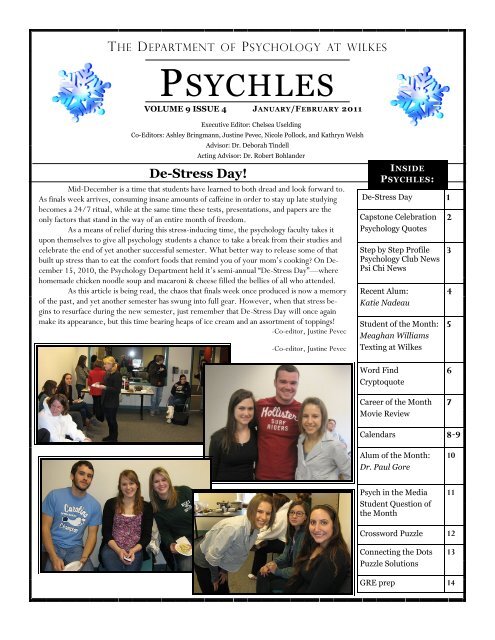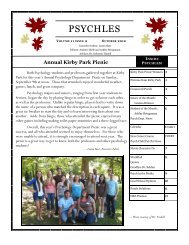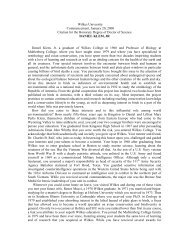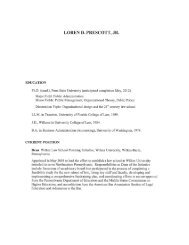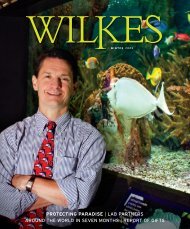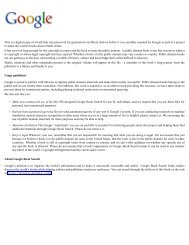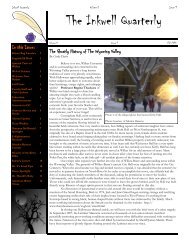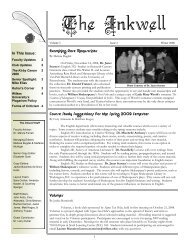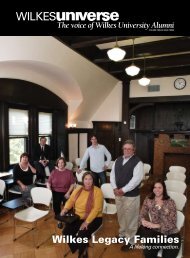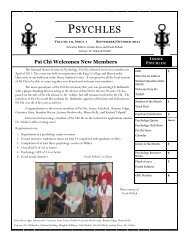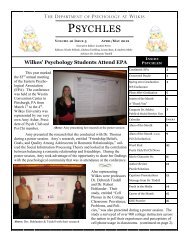February 2011 - Wilkes University
February 2011 - Wilkes University
February 2011 - Wilkes University
You also want an ePaper? Increase the reach of your titles
YUMPU automatically turns print PDFs into web optimized ePapers that Google loves.
THE DEPARTMENT OF PSYCHOLOGY AT WILKES<br />
PSYCHLES<br />
VOLUME 9 ISSUE 4<br />
Executive Editor: Chelsea Uselding<br />
Co-Editors: Ashley Bringmann, Justine Pevec, Nicole Pollock, and Kathryn Welsh<br />
Advisor: Dr. Deborah Tindell<br />
Acting Advisor: Dr. Robert Bohlander<br />
De-Stress Day!<br />
JANUARY/FEBRUARY <strong>2011</strong><br />
Mid-December is a time that students have learned to both dread and look forward to.<br />
As finals week arrives, consuming insane amounts of caffeine in order to stay up late studying<br />
becomes a 24/7 ritual, while at the same time these tests, presentations, and papers are the<br />
only factors that stand in the way of an entire month of freedom.<br />
As a means of relief during this stress-inducing time, the psychology faculty takes it<br />
upon themselves to give all psychology students a chance to take a break from their studies and<br />
celebrate the end of yet another successful semester. What better way to release some of that<br />
built up stress than to eat the comfort foods that remind you of your mom‘s cooking? On December<br />
15, 2010, the Psychology Department held it‘s semi-annual ―De-Stress Day‖—where<br />
homemade chicken noodle soup and macaroni & cheese filled the bellies of all who attended.<br />
As this article is being read, the chaos that finals week once produced is now a memory<br />
of the past, and yet another semester has swung into full gear. However, when that stress begins<br />
to resurface during the new semester, just remember that De-Stress Day will once again<br />
make its appearance, but this time bearing heaps of ice cream and an assortment of toppings!<br />
-Co-editor, Justine Pevec<br />
-Co-editor, Justine Pevec<br />
INSIDE<br />
PSYCHLES:<br />
De-Stress Day 1<br />
Capstone Celebration<br />
Psychology Quotes<br />
Step by Step Profile<br />
Psychology Club News<br />
Psi Chi News<br />
Recent Alum:<br />
Katie Nadeau<br />
Student of the Month:<br />
Meaghan Williams<br />
Texting at <strong>Wilkes</strong><br />
Word Find<br />
Cryptoquote<br />
Career of the Month<br />
Movie Review<br />
2<br />
3<br />
4<br />
Calendars 8-9<br />
Alum of the Month:<br />
Dr. Paul Gore<br />
Psych in the Media<br />
Student Question of<br />
the Month<br />
5<br />
6<br />
7<br />
10<br />
11<br />
Crossword Puzzle 12<br />
Connecting the Dots<br />
Puzzle Solutions<br />
13<br />
GRE prep 14
PAGE 2 PSYCHLES<br />
Senior Capstone Celebration!<br />
After faring through the endless drafts of PSY 300, students enter the most important class they will take as a psych<br />
major: Senior Capstone. After the stress of writing and conducting a research project, a celebration is necessary!<br />
All students who took Capstone in the fall of 2010, as well as their Capstone advisors Dr. Schicatano and Dr.<br />
Thomas, went to Rodano‘s to celebrate as a group that they had cleared their biggest hurdle at <strong>Wilkes</strong> <strong>University</strong>.<br />
The group sat at long table which made it easy for everyone to interact and enjoy each other‘s company.<br />
Ben Andrews, Senior psychology major, thought the event went well and that everyone was happy to celebrate<br />
their accomplishment together.<br />
Meaghan Williams, Senior psychology major, described the dinner as ―a very nice way to end a rewarding<br />
Capstone experience.‖ All Capstone students would like to thank Dr. Schicatano and Dr. Thomas for arranging the<br />
dinner. Congratulations seniors!<br />
Psychology Quotes<br />
―Knowledge rests not upon truth alone, but upon error also.‖<br />
– Carl Jung<br />
-Co-editor, Nicole Pollock<br />
Pictured (from left): Dr. Thomas, Andreanna Estades, Frantzddyn Pamphile, Laureen Jones, Ben Andrews, Brittany Daniels, Sara Kaspriskie, Mari<br />
Gabriel, Alison Kasper, Meaghan Williams, Alista Panteloukas, Cathy Stiles, Danielle Sanko, Peter Polyak, Dr. Schicatano, and Matt Watkins.<br />
―A failure is not a mistake, it may simply be the best one can do under the circumstances. The real mistake is to<br />
stop trying.‖<br />
– B.F. Skinner<br />
-Co-editor, Justine Pevec
PAGE 3 PSYCHLES<br />
Step by Step<br />
Step by Step, Inc. is a non-profit agency that serves people of all ages with mental illnesses, intellectual disabilities,<br />
and autism. According to their website, they serve over 2,000 people in all different regions of Pennsylvania.<br />
Step by Step provides a variety of services including children‘s behavioral services/counseling, community rehabilitation<br />
services, drug and alcohol rehabilitation, and living support programs.<br />
Psychology Club visits a Step by Step community home once a month in Kingston to do different activities like<br />
carve pumpkins, make cookies, and make Christmas decorations. There is a small number of people who live there,<br />
and only one is vocal; however, they always look forward to students coming! Step by Step usually accepts 4 to 5 volunteers<br />
at a time to spend time with residents from 5:30-7:00 p.m.<br />
Students at Step By Step carving pumpkins!<br />
From left: Brandon Hector, Carrie Early, and Hannah Connor<br />
This past semester, Nicole Pollock, Brandon Hector, Hannah Connor,<br />
Carrie Early, Sean LaFleur, Ashley Scott, and Shaney Rivers<br />
have all visited the Step by Step group home to spend time with the<br />
residents. It is a great experience because you get the chance to feel<br />
like you are making a difference in someone‘s day, not to mention<br />
learn a little about what it is like to interact with people with mental<br />
disabilities in a real-life setting and not out of a textbook.<br />
Visit dates to Step by Step are set-up around student‘s availability;<br />
so, come to a Psychology Club meeting for more information or<br />
contact nicole.pollock@wilkes.edu.<br />
More information about all of Step by Step‘s services can be found<br />
at www.stepbystepusa.com.<br />
Psychology Club News Psi Chi News<br />
Psych Club ended the Fall semester with an annual<br />
holiday party at their last meeting. Everyone relaxed<br />
and enjoyed some sweets before the stress of<br />
finals and holiday shopping started.<br />
Meetings will resume Tuesdays @ 11 in Breiseth<br />
316.<br />
An EPA deposit was due before break. An informational<br />
meeting will be held in the near future for<br />
those who deposited.<br />
A Step by Step date will be set following the first<br />
meeting of the semester.<br />
-Co-editor, Nicole Pollock<br />
-Co-editor, Nicole Pollock<br />
Psi Chi recently accepted new members! For those<br />
accepted, congratulations! If you are interested in<br />
joining Psi Chi, applications for membership will<br />
again be accepted in the Spring.<br />
Meetings will begin January 27th and will be held<br />
every other Thursday at 11am in Breis 305.<br />
Keep your eyes peeled for Psi Chi‘s annual Family<br />
Feud event! Sign ups will be held in early April!<br />
-Executive editor, Chelsea Uselding
PAGE 4 PSYCHLES<br />
Recent Alum: Katie Nadeau<br />
Katie graduated from <strong>Wilkes</strong> with her BA in Psychology last spring, so I thought it<br />
would be a good opportunity to catch up with one of our Alums to see how their transition to<br />
graduate school has been going. Katie is currently a freshman at the <strong>University</strong> of Southern<br />
Maine (USM), and is pursuing her Master’s Degree in Occupational Therapy. She agreed to answer<br />
some questions about the transition that she had to undergo only five months ago. (Pay attention<br />
seniors, this will be relevant to those of you who are planning on pursuing higher education<br />
after your undergraduate degree!)<br />
Did you find your transition from undergraduate to graduate school difficult?<br />
I found that once the nerves went away and I grasped the concept that graduate<br />
school does not have to be as difficult as I am assuming it to be, the transition was<br />
very do-able. The most difficult aspect for me in this transition was remembering that<br />
these courses represent my life, my career choice; therefore, I need to learn what the<br />
instructors assign as well as go further to absorb information on my own time such as<br />
the American Occupational Therapy Association (AOTA) monthly magazine issues.<br />
What would you say was the most dramatic difference that you encountered?<br />
In undergrad, I experienced a larger occurrence of taking exams than I did for writing papers, this being the most<br />
dramatic difference between graduate school and undergrad. However, I did feel prepared for the large amount of writing that<br />
I encountered immediately after beginning the program. Another noticeable difference was the instructors ‗supervision‘ over<br />
the students. In undergrad, especially in a small school like <strong>Wilkes</strong>, professors are preparing students to develop independence<br />
and responsibility in terms of being on time with assignments. On the graduate level, instructors already expect students to<br />
have successfully developed these qualities.<br />
What could <strong>Wilkes</strong> or you, personally, have done to better prepare yourself for the transition?<br />
I can honestly say that <strong>Wilkes</strong> <strong>University</strong>, especially my professors in the psychology department, made a positive<br />
impact on my ability to enter [this] situation. On a personal note, I could have better prepared myself for the transition by<br />
curing or improving my procrastination habit before entering grad school. I learned quickly that procrastination is not acceptable<br />
and will not aid in my goal of becoming an occupational therapist<br />
Finally, I would like to give the advice to shadow a person in the field of interest to you before applying to further education in<br />
the area. Loving the subject is what makes graduate school achievable and enjoyable.<br />
Do you have any advice that you would like to share with the <strong>Wilkes</strong> psychology students who will be<br />
graduating next semester?<br />
Focus on making yourself happy. Even after a four-year degree, it is sometimes difficult for a person to know what<br />
he/she wants to do in terms of a career. If possible, do some soul searching. If applying to graduate school, get your materials<br />
in early, especially in terms of official transcripts from the UCOM. Also, focus on your graduate school essays. I went to the<br />
career services building and made several appointments with Carol Bosack and Lisa Mulvey to review my essays and to improve<br />
them. They were great assets to the application process in terms of increasing my confidence in the material that I was<br />
sending in to each school. Also, email Sharon Castano about improving your resume; do not be afraid to ask your professors<br />
for guidance in life or careers choices, as well as for essays and graduate school applications. They are the best tools that students<br />
have access to and they will help in any way possible.<br />
-Co-editor, Justine Pevec
PAGE 5<br />
Student of the Month: Meaghan Williams<br />
What is your favorite memory at <strong>Wilkes</strong>?<br />
Texting Study at <strong>Wilkes</strong><br />
PSYCHLES<br />
Meaghan Williams is a senior Psychology major with a minor in both Neuroscience and Sociology.<br />
She is from Lake Ariel, Pennsylvania.<br />
What are your plans after you graduate?<br />
After I graduate, I hope to attend Kutztown <strong>University</strong> to obtain my M.Ed in<br />
Secondary Counseling.<br />
What activities are you involved in on campus?<br />
I'm the Co-President of Psi Chi, Social Events Chair of the Psychology Club,<br />
Captain of the <strong>Wilkes</strong> Women's Volleyball team, and a member of the Letterwomen's<br />
Club.<br />
What made you choose <strong>Wilkes</strong>?<br />
I chose <strong>Wilkes</strong> for its proximity to my hometown (I only live 40 minutes away)<br />
and for the small class sizes. I attended a small high school, so that made my transition to<br />
<strong>Wilkes</strong> that much easier. I had heard nothing but great things about all of <strong>Wilkes</strong>' academic<br />
programs, and I was also interested in playing Volleyball.<br />
My favorite memory at <strong>Wilkes</strong> would have to be my Senior Night this past October for Volleyball. I've played with<br />
my fellow Seniors for the past four years, and they've become my best friends. Senior Night was a great end to my college<br />
athletic career. I learned a lot from the game and my teammates, and wouldn't change anything about my experience.<br />
Any advice for other psychology majors?<br />
I would advise a Freshman to not sweat the small stuff. Mistakes are bound to be made, but you can only learn from<br />
them. Just be proud of yourself, work hard, and make time for yourself when you can!<br />
<strong>Wilkes</strong> <strong>University</strong> has recently been in many nationwide publications due to a study conducted by <strong>Wilkes</strong>‘ own Psychology<br />
Department professors, Dr. Tindell and Dr. Bohlander. The study focused on the prevalence of texting in the classroom and<br />
how much of a distraction it‘s becoming. The study sparked a lot of interest and was quickly picked up by The Associated Press as<br />
a story. Many <strong>Wilkes</strong> students were quoted in the article, arguing their stance on texting in the classroom. The article by The<br />
Associated Press also went on to highlight the fact that texting in class is a nationwide phenomenon, and is inciting many professors<br />
to create stricter classroom behavior policies.<br />
We are very proud of the psychology department, specifically Dr. Tindell and Dr. Bohlander, and the fact that their research<br />
has sparked so much debate nationwide! It just demonstrates that <strong>Wilkes</strong> <strong>University</strong> is a great institution whose professors<br />
and students will always be asking tough questions and seeking answers.<br />
If you would like to read the whole story from The Associated Press, it is located on the ABC website, at http://<br />
abcnews.go.com/Technology/wireStory?id=12248889.<br />
-Executive editor, Chelsea Uselding
PAGE 6 PSYCHLES<br />
Word Find<br />
Famous Psychologists<br />
H Z D Y Y B W W X S S X H D T<br />
W O L R A H S O K F M R P A D<br />
T K N Y P F F I L R Z Q U T T<br />
S S Z K V F N X N S D P A O X<br />
O N D J Z N C B S V A F D K I<br />
K X P N E V V T B Y Y M S I F<br />
F S L R O O O Y E O G R O W X<br />
A R X T Z L V U C O E S L V Z<br />
X L E T I V J H K G E J E N G<br />
F T L U B A U K O E Z U R O Q<br />
J Q C P D P Z R S E L L I S X<br />
X X Y I O G A H G X I Y K V Q<br />
T E E Z A R Q A C A Y G S Z Y<br />
R F B Y C R T R H V S F O C G<br />
Y F D I F V E W F P Y N N M I<br />
Cryptoquote<br />
WORD BANK<br />
ALLPORT<br />
BECK<br />
ELLIS<br />
ERIKSON<br />
FREUD<br />
HARLOW<br />
MASLOW<br />
PAVLOV<br />
ROGERS<br />
SKINNER<br />
-Co-editor, Kathryn Weksh<br />
“US IMG ZYNJ IZZN JZV MHWG UR H MHEEGL JZV IGYT IZ<br />
RGG GWGLJ FLZQNGE HR H YHUN”<br />
— HQLHMHE EHRNZA<br />
Clue: This psychologist created the hierarchy of needs.<br />
—Executive editor, Chelsea Uselding
PAGE 7<br />
Career of the Month: Forensic Psychologist<br />
Movie Review: Black Swan<br />
PSYCHLES<br />
CSI: Crime Scene Investigation and many other television shows are making the job of forensic psychologist look<br />
glamorous and are making the field a more popular career choice for individuals. This exciting career is a good choice<br />
for those looking for something in-between psychology and law.<br />
The job of a forensic psychologist can vary greatly; it is determined by what type of court system they work in.<br />
In the criminal court system, a forensic psychologist would be looking to see if the criminal has any disorders that would<br />
make it impossible for them to appear in court or if the disorder is the reason they committed the crime. They determine<br />
the intent for murder and if someone can be deemed ―insane‖ as a reason for what they did.<br />
In a family court, forensic psychologists act as counselors for family support and determine if the way the family<br />
works is appropriate for all members of the family. They give important information to people making decisions about<br />
people‘s lives such as who gains guardianship of children and completions of wills.<br />
This field of forensic psychology is growing rapidly due to the exposure people gain from watching television<br />
and other types of media. Forensic Psychology is a good way to help people, so those looking to help people find justice<br />
within the court system should look into forensic psychology as a career choice.<br />
SOURCES:<br />
http://www.allpsychologycareers.com/career/forensic-psychologist.html<br />
http://psychology.about.com/od/psychologycareerprofiles/a/forensicpsych.htm<br />
Photo from www.foxsearchlight.com/<br />
blackswan<br />
SPOILER ALERT!<br />
-Co-editor, Ashley Bringmann<br />
Black Swan is about a ballerina, Nina, who aspires to be named the queen<br />
swan in her company‘s production of Swan Lake. However, the role requires Nina<br />
to play both the pure white swan, and the seductive, evil black swan. While Nina<br />
has no trouble embodying the role of the white swan, she struggles with the black<br />
swan and soon finds competition in the arrival of a new ballerina, a free-spirit<br />
named Lily. The stress of the role soon finds Nina at the breaking point, as she<br />
struggles with her innocence, her freedom, and her sanity.<br />
This movie is one of the most provoking and intense movies I have ever<br />
seen. As you see the world through Nina‘s eyes, you begin to question what reality<br />
is. Like Nina, the viewer is experiencing two different worlds, two different movies.<br />
You never know what is actually happening, and what is purely a figment of<br />
Nina‘s deranged mind. Since you never know what is truly happening, you never<br />
know what is coming next, which leaves the viewer completely enthralled, trying<br />
to unravel the truth.<br />
Overall, this movie delivered everything I could have wanted. The ballet<br />
scenes were beautiful, and the horror scenes made me jump out of my seat. The<br />
plot, acting, cinematography, choreography, and music were all beautiful. I recommend<br />
that anyone who hasn‘t seen this movie, see it immediately, before it<br />
(hopefully) sweeps at the Oscars.<br />
-Executive editor, Chelsea Uselding
PAGE 8 PSYCHLES<br />
January <strong>2011</strong><br />
Sun Mon Tue Wed Thu Fri Sat<br />
26 27 28<br />
2 3<br />
9<br />
10<br />
16 17<br />
23<br />
Martin Luther<br />
King Jr. Day<br />
Classes Resume<br />
30 31<br />
4<br />
29 30 31 1<br />
5<br />
6 7<br />
11 12 13 14 15<br />
18<br />
Psychology Club<br />
11am<br />
Breis 316<br />
24 25<br />
Psychology Club<br />
11am<br />
Breis 316<br />
Winter Break<br />
Winter Break<br />
Winter Break<br />
19<br />
20<br />
26 27<br />
Psi Chi Meeting<br />
11am<br />
Breis 305<br />
8<br />
21 22<br />
28 29
PAGE 9 PSYCHLES<br />
<strong>February</strong> <strong>2011</strong><br />
Sun Mon Tue Wed Thu Fri Sat<br />
30 31 1<br />
6 7<br />
13<br />
14<br />
Happy Valentine’s<br />
Day!<br />
20 21<br />
27<br />
President’s Day<br />
28<br />
Psychology Club<br />
11:00am<br />
Breis 316<br />
8<br />
Psychology Club<br />
11:00am<br />
Breis 316<br />
15<br />
Psychology Club<br />
11:00am<br />
Breis 316<br />
22<br />
Psychology Club<br />
11:00am<br />
Breis 316<br />
2<br />
9<br />
3<br />
Connecting the Dots<br />
6-7:30pm<br />
Ballroom<br />
10<br />
Psi Chi Meeting<br />
11:00am<br />
Breis 305<br />
4<br />
11<br />
5<br />
12<br />
16 17 18 19<br />
23<br />
24<br />
Psi Chi Meeting<br />
11:00am<br />
Breis 305<br />
25<br />
26<br />
1 2 3 4 5<br />
6 7 8 9 10 11 12
PAGE 10 PSYCHLES<br />
Alum of the Month: Dr. Paul Gore<br />
Dr. Paul Gore graduated from <strong>Wilkes</strong> <strong>University</strong> in 1970 with a B.A. in<br />
Psychology. He went on to get his M.A. in Education and Clinical Psychology, as<br />
well as a Ph.D. in Clinical Psychology. He currently works as a clinical psychologist,<br />
and as Director of Behavioral Health at the Saban Free Clinic in Los Angeles,<br />
CA. We caught up with Dr. Paul Gore to see what he’s currently doing, and what<br />
his time at <strong>Wilkes</strong> was like.<br />
Can you tell us more about your current job?<br />
The Saban Free Clinic (formerly The Los Angeles Free Clinic)<br />
has been serving the underserved and underinsured of Los Angeles for<br />
over 40 years. We have 3 sites in the Hollywood area where patients can<br />
receive medical, dental, and behavioral health services. On a daily basis I<br />
direct a department of therapists and case managers to help our patients<br />
through counseling and linkages for psychosocial needs. No two days are<br />
alike for me. I have been in this position for 7 years and find it exciting,<br />
rewarding, fulfilling, stimulating and often exhausting.<br />
What do you do when you’re not working?<br />
I like to keep my life balanced outside of work. Keeping in good physical shape is important and I work out<br />
regularly at a gym, play tennis, travel, hike, and have completed the LA Marathon seven times. I have a 21 year old<br />
daughter, Terra, in college. In December I will complete a certificate program at the UCLA School of Public Health in<br />
Healthcare Management Leadership. I stay current with the cultural arts in Los Angeles, especially theater, and have<br />
been known to dabble on stage in an occasional role.<br />
What was your fondest memory of <strong>Wilkes</strong>?<br />
The people. The classmates. The lifelong friends that came from <strong>Wilkes</strong>. Staying up all night talking in the<br />
dorm trying to figure out life and who we were. Walking along the river banks and trestle in the middle of winter.<br />
The late 60‘s were an exciting time to be in college and a time of change in society and within ourselves.<br />
How did <strong>Wilkes</strong> help you achieve your goals, and reach the career you have now?<br />
<strong>Wilkes</strong> started me on the road to a career in psychology. Beginning as a Biology major, I decided my passion<br />
was in working with people and understanding the mind and human behavior.<br />
What advice would you like to give current Psychology students at <strong>Wilkes</strong>?<br />
Enjoy this special time in your lives. The field of Psychology is ever-changing and evolving. Be open to new<br />
ideas. Become a critical thinker. A degree in Psychology can lead in many directions. The field is wide open and is<br />
evolving more and more into the business and healthcare worlds. If an idea from a professor, a class, a book, or life<br />
resonates within you, commit to it and trust it will lead you to your passion and dream.<br />
-Executive editor, Chelsea Uselding
PAGE 11<br />
Psychology in the Media<br />
PSYCHLES<br />
So what‘s your New Year‘s resolution? I cannot count the number of times I have been asked this over the<br />
last few weeks. Personally I don‘t really understand why anyone would make one. Does anyone even keep them?<br />
According to a study done by a Psychology professor from the <strong>University</strong> of Hertfordshire, Richard Wiseman,<br />
50% of 3,000 people surveyed were confident about keeping their resolutions. Out of those, only 12 percent<br />
actually kept their resolutions within the first two weeks.<br />
This begs the question of why can‘t we keep up with our resolutions? One theory is that we don‘t fulfill<br />
promises when we are not making them for ourselves. During New Year‘s, we make resolutions because it is tradition<br />
to do so, not because we are really motivated to achieve them.<br />
Another study from Dr. Alan Marlatt from the Addictive Behaviors Research Center at the <strong>University</strong> of<br />
Washington states that people are motivated to either stop or start something with a resolution; however, it is better<br />
if you are motivated to do both. This study also went on to show resolutions are often too big and complex to<br />
stay motivated, and instead of breaking them down into manageable parts, we completely give up.<br />
It‘s all comes down to motivation. Having motivation makes a person emotionally capable of doing something<br />
they wish to achieve. Thus, with insufficient motivation, we fail to meet goals. So if you made a resolution<br />
this year, use these theories to succeed: make your goals manageable, and be motivated to both start and stop<br />
something.<br />
SOURCES:<br />
http://www.middletownjournal.com/news/middletown-news/the-new-year-is-a-time-to-set-goals-1042951.html<br />
http://www.asylum.com/<strong>2011</strong>/01/03/only-about-one-in-ten-new-years-\resolutions-succeed/<br />
http://www.highlandernews.org/opinions/resolution-making-a-useless-tradition-for-making-life-changingdecisions-1.1834033<br />
30%<br />
20%<br />
Student Question of the Month<br />
50%<br />
Snow days<br />
Seeing my friends<br />
My classes<br />
-Co-editor, Ashley Bringmann<br />
We asked 10 students,<br />
what are you most<br />
looking forward to<br />
this spring semester?<br />
- Chelsea Uselding, Co-editor
PAGE 12<br />
Across<br />
4. The father of American Psychology<br />
6. If well known for his concepts of self-efficacy and<br />
social learning<br />
7. He is well known for his stage theory of psychoso-<br />
cial development<br />
8. The founder of psychoanalysis<br />
9. He is known for his concept of archetypes and the<br />
collective unconscious.<br />
12. He developed a trait theory of personality that<br />
described three broad categories of personality traits.<br />
13. Psychologist best known for his stage theory of<br />
cognitive development<br />
14. Is often referred to as the father of behaviorism<br />
-Created by Co-editor, Ashley Bringmann<br />
Crossword Puzzle<br />
PSYCHLES<br />
Down<br />
1. Best known for establishing the very first psychology lab<br />
in Leipzig, Germany.<br />
2. A prominent psychoanalyst best known for her theories<br />
of neurosis, feminine psychology, and self psychology.<br />
3. Famous for his hierarchy of needs and concepts of self-<br />
actualization.<br />
5. She developed the ―Strange Situation assessment.<br />
10. He was the first to study classical conditioning.<br />
11. An important contributor to the development of human-<br />
istic psychology.
PAGE 13 PSYCHLES<br />
Connecting the Dots<br />
On <strong>February</strong> 3rd, <strong>2011</strong>, Undergraduate Alumni Relations will host it‘s 4th annual Connecting the Dots event!<br />
The event will give <strong>Wilkes</strong> students a chance to socialize with about 25 alumni from various professions. The event<br />
will be held in the Ballroom, on the second floor of the SUB from 6:00pm to 7:30pm. All students are encouraged to<br />
attend to make important connections for future jobs and internships!<br />
Solutions<br />
Word Find Crossword Puzzle<br />
H Z D Y Y B W W X S S X H D T<br />
W O L R A H S O K F M R P A D<br />
T K N Y P F F I L R Z Q U T T<br />
S S Z K V F N X N S D P A O X<br />
O N D J Z N C B S V A F D K I<br />
K X P N E V V T B Y Y M S I F<br />
F S L R O O O Y E O G R O W X<br />
A R X T Z L V U C O E S L V Z<br />
X L E T I V J H K G E J E N G<br />
F T L U B A U K O E Z U R O Q<br />
J Q C P D P Z R S E L L I S X<br />
X X Y I O G A H G X I Y K V Q<br />
T E E Z A R Q A C A Y G S Z Y<br />
R F B Y C R T R H V S F O C G<br />
Y F D I F V E W F P Y N N M I<br />
Connecting the Dots<br />
<strong>February</strong> 3rd, <strong>2011</strong><br />
6:00-7:30pm<br />
Ballroom<br />
Cryptoquote<br />
―If the only tool you have is a hammer, you tend to see every problem as a nail.<br />
-Abraham Maslow
PAGE 14 PSYCHLES<br />
-Kathryn Welsh, Co– editor<br />
Department of Psychology<br />
84 W. South St.<br />
VOCABULARY<br />
<strong>Wilkes</strong>-Barre, PA 18766<br />
THE DEPARTMENT OF PSYCHOLOGY AT<br />
WILKES UNIVERSITY<br />
PSYCHLES<br />
Deborah Tindell, Ph.D., Departmental Coordinator<br />
Department of Psychology at <strong>Wilkes</strong> <strong>University</strong><br />
570-408-4565<br />
deborah.tindell@wilkes.edu<br />
Chelsea.Uselding@wilkes.edu<br />
Nicole.Pollock@wilkes.edu<br />
William.Schweitzer@wilkes.edu<br />
Kathryn.Welsh@wilkes.edu<br />
Compunction n Remorse; uneasiness caused by guilt.<br />
Tocsin (n) -A warning signal; a bell that is used to sound an<br />
alarm.<br />
Propitious (adj.) - Auspicious; presenting favorable<br />
circumstances; benevolent.<br />
Deliquescent (adj.) - Tending to melt.<br />
Devolve (v) - To deputize; to pass duties on to somebody<br />
else.<br />
Source:<br />
http://www.mygretutor.com/vocabularyGREDifficult.aspx<br />
GRE Practice<br />
View Psychles Online!<br />
http://wilkes.edu/pages/3342.asp<br />
Also follow us on Twitter!<br />
MATH: Coordinate Geometry<br />
Two real number lines intersecting at right angles at<br />
the zero point on each number line define a rectangular coordinate<br />
system, often called the XY-coordinate system or XY-plane.<br />
The horizontal number line is called the x-axis, and the vertical<br />
number line is called the y-axis. The lines divide the plane into<br />
four regions called quadrants (I, II, III, and IV).<br />
Each point in the system can be identified by an ordered<br />
pair of real numbers (x, y), called coordinates. The xcoordinate<br />
expresses distance to the left (if negative) or right<br />
(if positive) of the y-axis, and the y-coordinate expresses distance<br />
below (if negative) or above (if positive) the x-axis.<br />
Source:<br />
http://www.ets.org/Media/Tests/GRE/pdf/<br />
GREmathPractice.pdf


